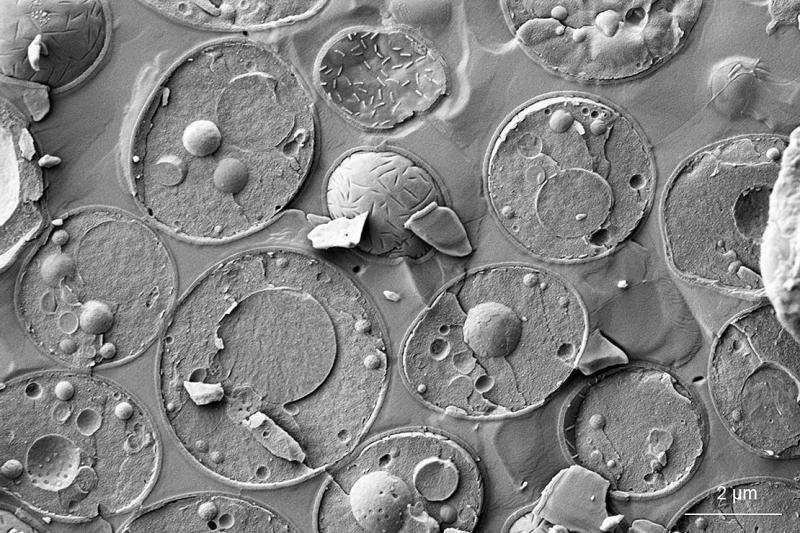Baker's yeast. Credit: ZEISS Microscopy
A team of scientists has discovered that a protein in common baker's yeast helps control cell division – findings that may have implications for understanding diseases such as cancer.
A protein called Yih1, for Yeast Homologue of the mammalian protein IMPACT, was studied by researchers from Massey University, Brazil's Universidade Federal de São Paulo and Upstate Medical University in New York, who found it plays a role in cell division.
Yeast cells without Yih1 are "held up" in a particular part of the cell division cycle, somewhere before the cells are splitting apart.
Dr Evelyn Sattlegger from Massey University's Institute of Natural and Mathematical Sciences, says understanding how cell division is controlled will help understand how diseases operate. It is known that cancer cells have found ways to overcome the control points that naturally exist but not fully how they do it.
"Cell division follows a complex step-wise process, and many of these steps are controlled by a series of proteins and enzymes," Dr Sattlegger says. "These control points are known as checkpoints. In normal cells these checkpoints ensure that cell division only occurs at a controlled rate but cancer cells have found ways to overcome them.
"We need to know in detail how checkpoints in the cell work. Most importantly, we need to identify all checkpoints."
She says yeast is an excellent model for answering fundamental questions about how cell division operates, and how it is controlled, because yeast can be manipulated very easily and the proteins in yeast can be found in other animals. Essentially, the Yih1 protein is the yeast form of the human version, called "imprinted and ancient protein" – or IMPACT.
"These IMPACT proteins are found in virtually all eukaryotes, from basic yeast to complex mammals, including humans. This means we can use the simple yeast to study in detail what happens when we don't allow these proteins to be made by the cell."
The Sattlegger research group was awarded Marsden funding in 2006 to study the role that other enzymes and proteins (Gcn1 and Gcn2) play in cell function. Other researchers have found that Gcn2 plays a specialised but crucial role in how diseases such as cancer cope with being starved of nutrition.
The group's latest research was published today in the publically-accessible journal PLOS ONE.
More information: "The Gcn2 Regulator Yih1 Interacts with the Cyclin Dependent Kinase Cdc28 and Promotes Cell Cycle Progression through G2/M in Budding Yeast." PLoS ONE 10(7): e0131070. DOI: 10.1371/journal.pone.0131070
Journal information: PLoS ONE
Provided by Massey University






















